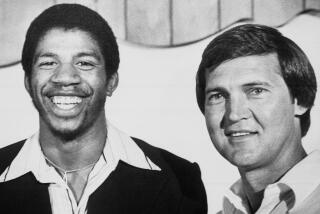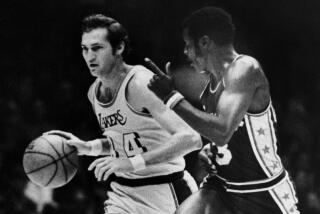A Legacy of Pain and Hope
- Share via
Lots of basketball players want to be remembered for their rebounds, three-point baskets, slam dunks, steals and blocked shots, but Spencer Haywood wants to be remembered for loftier legacies. He wants to be remembered for Supreme Court decisions, constitutional issues and the right of individuals to work where they choose.
There never was a player quite like ‘Wood, as the players liked to call him. He could do everything--or almost everything--Michael Jordan could do later. A near-7-footer without an ounce of fat on him, he was graceful, trim, quick, mobile. He could play either forward position and fill in at center if the occasion called for it.
Whole leagues drooled for him. In the American Basketball Assn., he once scored 59 points and had 25 rebounds. He had a stretch during which he scored consecutively, 43, 36, 43, 46 and 47 points. He was as unstoppable as nightfall.
It was an old story. Spencer had been brought up in “Yassuh, boss” Mississippi, where you didn’t eat unless you chopped cotton or picked the pecans that had fallen from a tree. And he appeared to have a lively career as the world’s tallest cotton baler--until he went north to Chicago and Detroit with a brother. There, he made the extraordinary discovery that white men, with whom he had limited contact in Silver City, Miss., except when they hit golf balls at their caddies at the country club, would pay unlimited amounts of money to anyone with a sure-fire jump shot.
The University of Tennessee signed him at a cost of a new, red Oldsmobile and a 100% clothing discount. But by now Haywood was beginning to get an inkling of what the traffic would bear. He played hard to get, went to the University of Detroit and junior colleges. The highest bidder.
Then came one of the greatest breaks of his life. At the 1968 Mexico City Olympics, many of the nation’s finest basketball players, including Kareem Abdul-Jabbar, Elvin Hayes and Wes Unseld, declined to represent the United States in basketball. Some 25 of the country’s best players joined them.
Haywood didn’t. He thanked them for giving him this opportunity and went out and brought back the inevitable gold medal for the United States. Now, he was not only a sports star, he was Nathan Hale.
There was no way America’s Hero was going to stay in college stacking up triple-triples for dear old Siwash (read, Detroit). At the time, the pro leagues had an unwritten agreement with the colleges they would not draft a player until his class graduated.
History shows it was Haywood who first broke this gentlemen’s agreement. It was to get Haywood that the “hardship” clause was written in league bylaws permitting the drafting of a player who could show financial need.
But that was the ABA. A couple of years later, Haywood prepared to jump to the NBA, but the senior league tried to bar him because he had violated the four-year agreement.
The Supreme Court of the United States ruled, 7-2, he had a perfect right to do so. “Think of it!” Haywood marveled. “Former Mississippi cotton-picker wins a favorable ruling from the U.S. Supreme Court. Only five years before, my mother had to beg to get me out of jail on some trumped-up charge.”
Adds Haywood: “Every time I see Dr. J, or Magic or Michael Jordan, I say, ‘Hey, you know what you owe me? If it weren’t for me, you would have had to stay in college four years.’ ”
It should all have been sunshine and roses for basketball’s pioneer after that. It wasn’t.
In a remarkable book, “Spencer Haywood--The Rise, The Fall, The Recovery” with Scott Ostler, the man who freed the slaves on the basketball court tells how he sold himself into slavery off of it. He found one opponent he couldn’t slam dunk on, an opponent who kept taking the ball away from him.
Haywood fouled out in life. The young man who only years before had been picking pecan shells, who had never used a knife and fork in his life, was throwing $300,000 parties for his fashion model wife and friends in New York.
His game went to hell. Instead of free-throwing, he was free-basing. Games were a useless interruption to an otherwise ecstatic existence.
He went through franchises like a train through tank towns. Finally, he ended up on the Lakers, the storied team of Abdul-Jabbar, Magic, Jamaal Wilkes and company. Haywood was on the team, but not of it. He was in a cocaine haze. Finally, he passed out cold during a practice for the NBA championship game against Philadelphia. He was kicked off the team.
Drug paranoia set in. “I actually convinced myself Magic Johnson was deliberately throwing passes too hot for me to handle. Kareem was deliberately clogging my way to the basket.”
Incredibly, he found himself contacting an underworld hit man to put out a contract on the coach, Paul Westhead. He came to his senses after a talk with his mother.
The Lakers shipped him off to Venice, Italy. Haywood lived like a Doge, the press there saluted him as the Moor of Venice, but Spencer angled to get back in the NBA. He had some scores to settle. And scores to make.
He caught on with the Washington Bullets. It was only a matter of time before the dealers found him, and it was a debacle as before.
Haywood woke one morning in a miasma of lurid headlines “Haywood Kidnaps Daughter!” He took stock of himself.
“I needed help. I got out of denial. Cocaine is a trickster. It had played me for a fool for the last time. I put my ego behind me and I got clean and have stayed clean.”
Haywood today is an apartment house contractor in Detroit, and his Spencer Haywood Foundation was formed to combat drug abuse in the inner cities. “It’s the biggest problem we have. If it could trick me with all I had to lose, what chance do the powerless have?”
Haywood still wants to contribute something to society other than rebounds, low posts and give-and-gos. He wants to put a full-court press on a real adversary before it slam-dunks our society.
* KEN NORMAN: Clipper forward to miss at least six games because of chickenpox. C5.
More to Read
Go beyond the scoreboard
Get the latest on L.A.'s teams in the daily Sports Report newsletter.
You may occasionally receive promotional content from the Los Angeles Times.










